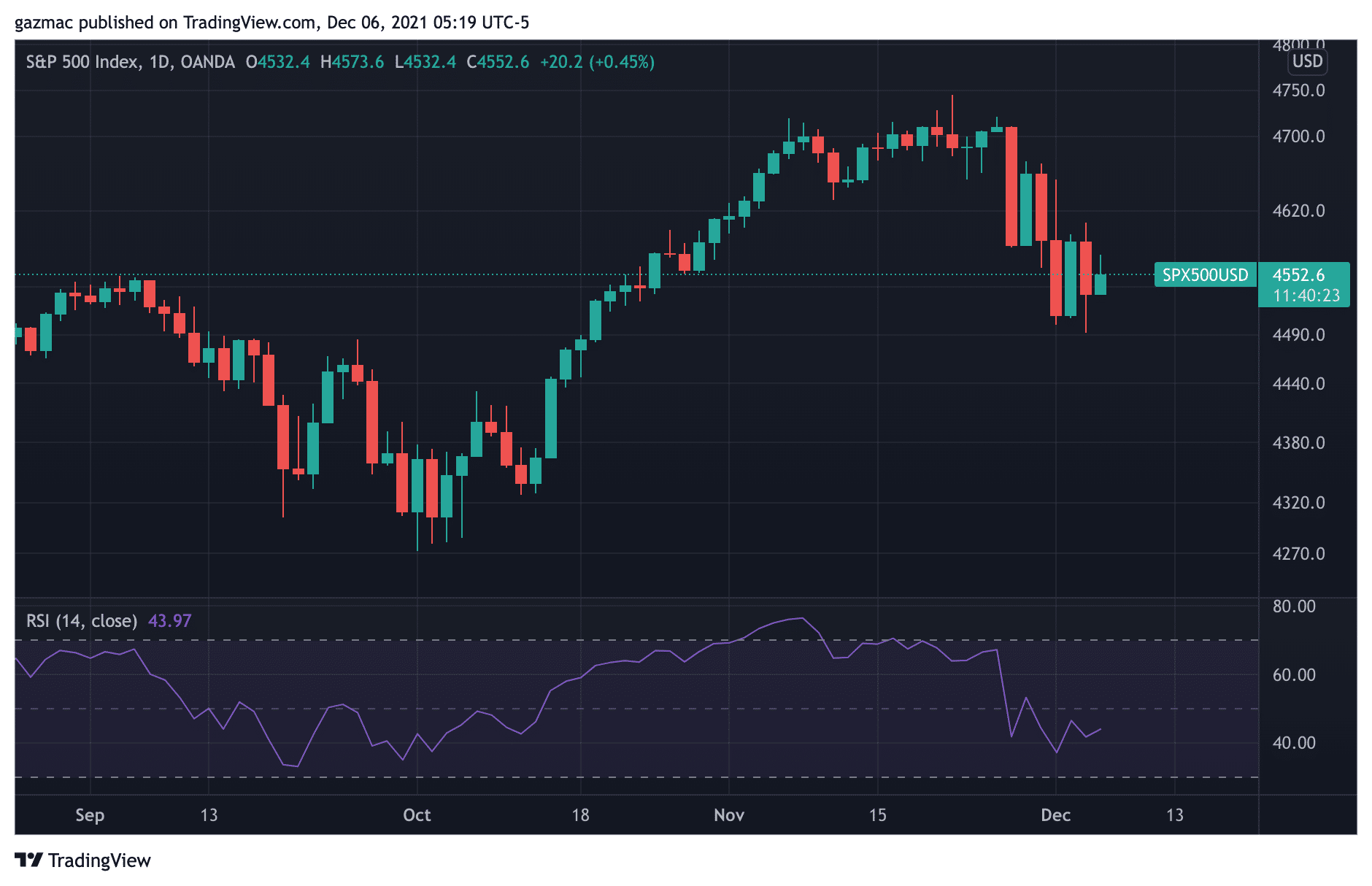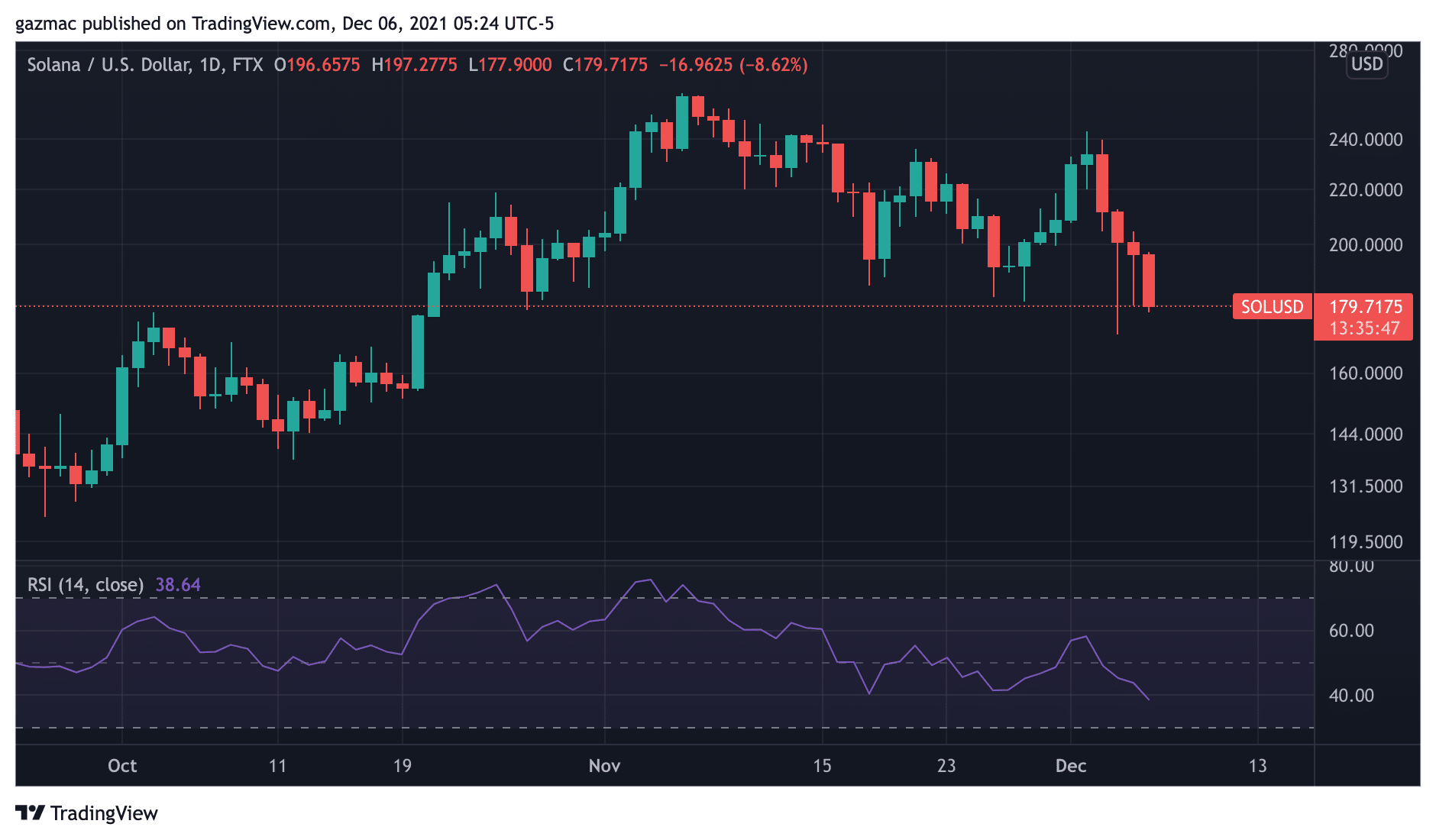Stock Indices Preview: Omicron and Monetary Policy Uncertainty Dominate
Please note that we are not authorised to provide any investment advice. The content on this page is for information purposes only.
After a volatile week, stock indices are on the front foot on Monday, although the how omicron fears develop and uncertainty over the direction of monetary policy will likely dominate the week.
Stocks start higher in Europe, US futures green, China cuts bank capital requirements
US equities are set to open higher, with the Dow and S&P 500 futures both around 0.50% higher, while the European session sees the FTSE 100 trading 0.80% higher at 7170 and Germany’s Dax index up 0.85% to 15,298.

However, Hong Kong’s Hang Seng dropped 1.8 per cent, reflecting the pain investors in Chinese Big Tech stocks are experiencing at the moment as regulatory squeezes at home combine with uncertainty around their New York listings, with Didi announcing its delisting, pressuring valuations lower.
Today the People’s Bank of China announced that the bank reserve requirement ratio will be cut by 0.5% to 8.4% from 15 December, although it wont apply to rural lenders.
The surprise move comes as the real estate sector is burdened with high debt levels and the threat of default by the largest developer in the country, Evergrande, still looms large.
In a sign of persisting risk-off sentiment despite the rise in stocks this morning is the continuing selling in the crypto complex, where bitcoin is down 3% at $47,440. Recent high flyers LUNA is off 18%, falling to $62 and fast-growing smart contract platform Solana is down 9% to $179.

Omicron infection rate high but hospitalisations low in South Africa
With more data coming in that seems to support the view that the omicron variant symptoms are similar to the Delta variant or milder, there are strengthening hopes that the effects of the highly transmissible variant may not be as bad as at first feared.
Although the infection rate has surged in South Africa, this has not been mirrored in hospitalisations.
Accordingly, crude oil is picking up steam to start the week. WTI is 2% the better at $67.61 and Brent on $71.13, up 1.86%.
Powell turns hawkish on inflation but non-farm payrolls indicate slowing recovery
However, investors face an uncertain period of trading ahead underlined by a US non-farm payrolls report on Monday that was well below forecast.
Employers added data 210,000 to their payrolls, which was a big miss on the 550,000 forecast by economists. But despite the lowest increase of the year, unemployment still fell to 4.2% and the labour force participation rate, which is closely watched by the Fed, improved to 61.8%.
Bond yields rose in response to the jobs data and the equity markets fell.
The household survey half of the jobs report (the other half being the employer-focused report) saw 1.14. million jobs added, representing a sharp upturn in participation.
Also, despite the improvements, the fed will be worried that the slowdown in the non-farm payrolls figures could signal that the economic recovery is slowing, even though inflation may stay stubbornly high or deteriorate further.
US inflation is currently running hot at a 30-year high at 6.2%.
Labour participation rate improves but still short of pre-pandemic levels
US employment has still not returned to pre-pandemic level, being 3.9 million short.
The participation rate includes those who are looking for work in addition to those who are in employment. However, the data does not cover the period since the emergence of the omicron variant, and that could put a brake on the participation rate and even throw it into reverse.
Last week’s data has put the Fed into even more of a bind as it tries to weight up progress on its twin price stability and labour market mandates.
Fed retires “transitory” description in favour of “persistently higher inflation”
The balance of market expectations has been tilted firmly towards the Fed speeding up its tapering of asset purchases after chair Jerome Powell made hawkish comments to Congress regarding the need to put a lid on elevated inflation.
Powell said early last week that the word “transitory” should be retired as a description of thew state of inflation, which instead defined as being “persistently higher”. Powell said that taper should be completed “perhaps a few months sooner”.
Equity markets have interpreted those comments as likely to bring forward interest rate rises next year too, hence the falls on Friday.
Bank of England set to wait on omicron data before raising interest rates
Later today the Bank of England’s Ben Broadbent is making at speech and he could follow in the dovish footsteps of bank official Michael Saunders.
Saunders said last week that the Bank should wait to see how the omicron variants looks like its is going to play out before making its rate decision.
In his speech delivered on 3 December Saunders said: “At present, given the new Omicron COVID variant has only been detected quite recently, there could be particular advantages in waiting to see more evidence on its possible effects on public health outcomes and hence on the economy.”
An increase interest rates was expected as soon as this month, with Saunders voting to raise rates at the last meeting of the monetary policy committee. His dovish comments are likely responsible for the pound’s weakness against the dollar today.
The Dollar index (DXY) is 0.14% stronger this morning, which may be the afterglows of last week’s safe haven buying.





